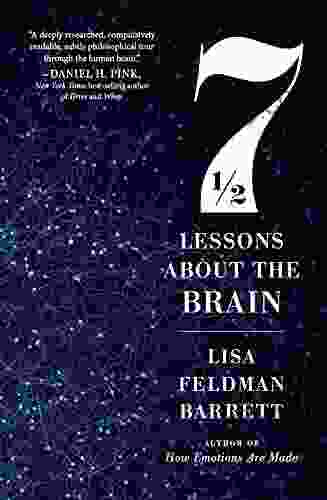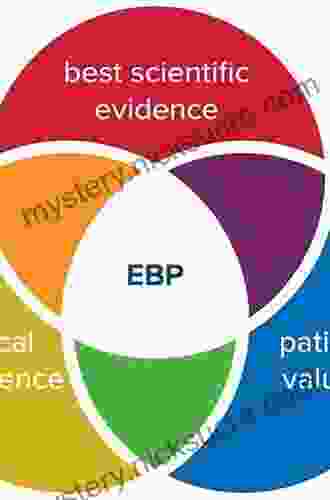Epidemiology for Athletic Trainers: Integrating Evidence-Based Practice for Optimal Patient Care

Athletic trainers are healthcare professionals who specialize in the prevention, diagnosis, and treatment of sports-related injuries. As part of their role, they play a vital role in the implementation of evidence-based practice (EBP),which involves using the best available scientific evidence to guide clinical decision-making. Epidemiology, the study of the distribution and patterns of health-related events and conditions within a population, provides a foundation for EBP by helping athletic trainers understand the incidence, prevalence, and risk factors associated with sports injuries.
Epidemiology in Athletic Training
Epidemiological studies provide valuable insights into various aspects of sports injuries, including:
4.5 out of 5
| Language | : | English |
| File size | : | 6682 KB |
| Text-to-Speech | : | Enabled |
| Screen Reader | : | Supported |
| Enhanced typesetting | : | Enabled |
| Print length | : | 547 pages |
- Injury Rates: Epidemiology can help determine the incidence and prevalence of specific injuries in different sports, populations, and activity levels. This information is essential for identifying high-risk groups and developing tailored prevention strategies.
- Injury Patterns: Epidemiological studies can reveal the common patterns and locations of sports injuries. This knowledge helps athletic trainers develop appropriate diagnostic and treatment protocols and target rehabilitation efforts effectively.
- Risk Factors: Epidemiology identifies factors that increase the likelihood of developing sports injuries. These may include age, sex, body composition, training habits, equipment use, and environmental conditions. Understanding these risk factors enables athletic trainers to develop targeted interventions and implement injury prevention programs.
- Injury Trends: By monitoring injury rates over time, epidemiology can help track trends and identify emerging injury patterns. This information allows athletic trainers to adapt their practices and develop new strategies to address evolving injury profiles.
Integrating EBP
Integrating epidemiological data into clinical practice allows athletic trainers to make informed decisions based on the best available evidence. By understanding the epidemiology of sports injuries, athletic trainers can:
- Develop Targeted Prevention Programs: Epidemiology helps identify high-risk groups and specific risk factors for sports injuries. This information can be used to design tailored prevention programs that address the unique needs of different populations and activities.
- Enhance Diagnostic Accuracy: By being aware of common injury patterns, athletic trainers can improve their diagnostic accuracy. Epidemiology provides a basis for considering the most likely injuries based on the athlete's symptoms, sport, and activity level.
- Optimize Treatment Protocols: Epidemiological data can inform treatment decisions. By understanding the typical course of recovery for different injuries, athletic trainers can develop optimal rehabilitation protocols that promote faster and more effective healing.
- Educate Athletes and Coaches: Epidemiology can help athletic trainers educate athletes and coaches about injury risks, prevention strategies, and the importance of early reporting and appropriate management of injuries.
Challenges and Future Directions
While epidemiology plays a crucial role in EBP for athletic trainers, there are certain challenges and areas for future research:
- Data Collection: Collecting accurate and comprehensive injury data can be challenging, especially in amateur and recreational sports settings. Future research should focus on developing standardized injury reporting systems and improving data quality.
- Causality: Epidemiology often identifies risk factors, but establishing causality can be difficult. Longitudinal studies and other research designs are needed to better understand the causal relationships between risk factors and sports injuries.
- Translational Research: Translating epidemiological findings into practical interventions remains crucial. Future research should focus on developing and evaluating effective injury prevention programs based on epidemiological data.
- Education and Training: Ensuring that athletic trainers have adequate training in epidemiology is essential for integrating EBP into clinical practice. Future educational initiatives should emphasize the importance of epidemiology and provide practical tools for applying epidemiological principles in athletic training settings.
Epidemiology provides a solid foundation for evidence-based practice in athletic training. By understanding the epidemiology of sports injuries, athletic trainers can develop targeted prevention programs, enhance diagnostic accuracy, optimize treatment protocols, and educate athletes and coaches. Ongoing research and collaboration are essential to address challenges and advance the integration of epidemiology into athletic training practice. Ultimately, this will lead to improved outcomes and optimal care for athletes at all levels.
Image Descriptions
- Alt text: Athletic trainer examining an athlete's knee injury Description: An athletic trainer is assessing an athlete's knee for potential injuries, highlighting the importance of accurate diagnosis and treatment.
- Alt text: Graph showing injury rates by sport Description: A graph representing the incidence of sports injuries across different sports, indicating the varying risks associated with specific activities.
- Alt text: Athletic trainer educating a group of athletes about injury prevention Description: An athletic trainer is providing education to a group of athletes on injury prevention strategies, emphasizing the value of knowledge and awareness.
4.5 out of 5
| Language | : | English |
| File size | : | 6682 KB |
| Text-to-Speech | : | Enabled |
| Screen Reader | : | Supported |
| Enhanced typesetting | : | Enabled |
| Print length | : | 547 pages |
Do you want to contribute by writing guest posts on this blog?
Please contact us and send us a resume of previous articles that you have written.
 Fiction
Fiction Non Fiction
Non Fiction Romance
Romance Mystery
Mystery Thriller
Thriller SciFi
SciFi Fantasy
Fantasy Horror
Horror Biography
Biography Selfhelp
Selfhelp Business
Business History
History Classics
Classics Poetry
Poetry Childrens
Childrens Young Adult
Young Adult Educational
Educational Cooking
Cooking Travel
Travel Lifestyle
Lifestyle Spirituality
Spirituality Health
Health Fitness
Fitness Technology
Technology Science
Science Arts
Arts Crafts
Crafts DIY
DIY Gardening
Gardening Petcare
Petcare Susan Frederick Gray
Susan Frederick Gray Emily Lowry
Emily Lowry Jennifer Rose
Jennifer Rose Elena Paige
Elena Paige Jen Howver
Jen Howver Shaunti Feldhahn
Shaunti Feldhahn Trevelyan
Trevelyan Chad Eastham
Chad Eastham Buddy Levy
Buddy Levy Eric P Lane
Eric P Lane Ron Rapoport
Ron Rapoport Mark Hansen
Mark Hansen Pedro Urvi
Pedro Urvi Paige Powers
Paige Powers Hugh Aldersey Williams
Hugh Aldersey Williams Dr Tommy John
Dr Tommy John Douglas P Fry
Douglas P Fry Erin Macy
Erin Macy Cal Newport
Cal Newport Ransom Riggs
Ransom Riggs Bruce Sutherland
Bruce Sutherland Tey Meadow
Tey Meadow Frederick Jackson Turner
Frederick Jackson Turner Matthew Marchon
Matthew Marchon Freya Pickard
Freya Pickard Mary C Townsend
Mary C Townsend Maha Alkurdi
Maha Alkurdi Don Allen Jr
Don Allen Jr Leon Speroff
Leon Speroff J R Rain
J R Rain Ned Feehally
Ned Feehally Dory Willer
Dory Willer Orangepen Publications
Orangepen Publications Ken Sande
Ken Sande Sheri Morehouse
Sheri Morehouse Shyima Hall
Shyima Hall Ashley Christensen
Ashley Christensen Nick Tumminello
Nick Tumminello Michael D Alessio
Michael D Alessio Dave Bosanko
Dave Bosanko Stedman Graham
Stedman Graham Michael Mewshaw
Michael Mewshaw Tricia Levenseller
Tricia Levenseller R Scott Thornton
R Scott Thornton Natasha Daniels
Natasha Daniels Steve Barrett
Steve Barrett Mike X Cohen
Mike X Cohen Barbara Acello
Barbara Acello Ira K Wolf
Ira K Wolf Stephen King
Stephen King Jim Warnock
Jim Warnock Valerie Poore
Valerie Poore Julietta Suzuki
Julietta Suzuki Scott Mcmillion
Scott Mcmillion Duncan Steel
Duncan Steel Kendall Rose
Kendall Rose Kathy Woods
Kathy Woods Stephen Harrison
Stephen Harrison Nicholas Tomalin
Nicholas Tomalin Sterling Test Prep
Sterling Test Prep Joe Baker
Joe Baker Jess J James
Jess J James Narain Moorjani
Narain Moorjani Richard C Francis
Richard C Francis Carrie Marie Bratley
Carrie Marie Bratley Gary Lewis
Gary Lewis Tim Glover
Tim Glover Matt Price
Matt Price Joseph Correa
Joseph Correa Winslow Tudor
Winslow Tudor S M Kingdom
S M Kingdom Kacen Callender
Kacen Callender Jared Diamond
Jared Diamond Fern Schumer Chapman
Fern Schumer Chapman Max Lugavere
Max Lugavere Mark Young
Mark Young Edward Humes
Edward Humes Judith Merkle Riley
Judith Merkle Riley Bruce W Harris
Bruce W Harris Nawuth Keat
Nawuth Keat Tim Freke
Tim Freke Mark Stavish
Mark Stavish Tibor Rutar
Tibor Rutar Nicola S Dorrington
Nicola S Dorrington Sophie D Coe
Sophie D Coe Thomas Achatz
Thomas Achatz Victoria Honeybourne
Victoria Honeybourne Elmer Keith
Elmer Keith Richard Henry Dana
Richard Henry Dana Laurie Notaro
Laurie Notaro John Jamieson
John Jamieson Romola Anderson
Romola Anderson Paul Murdin
Paul Murdin William Rathje
William Rathje William M Baum
William M Baum Jason Runkel Sperling
Jason Runkel Sperling David Tanis
David Tanis Paul Rabinow
Paul Rabinow Roger J Davies
Roger J Davies Ivar Dedekam
Ivar Dedekam Ron Senyor
Ron Senyor Katie Fallon
Katie Fallon Thomas Deetjen
Thomas Deetjen Thomas Carothers
Thomas Carothers Sallyann Beresford
Sallyann Beresford Robert Larrison
Robert Larrison Dina Nayeri
Dina Nayeri George Daniel
George Daniel Oprah Winfrey
Oprah Winfrey David Eagleman
David Eagleman Cathy Glass
Cathy Glass Shea Ernshaw
Shea Ernshaw Lisa Feldman Barrett
Lisa Feldman Barrett Rob Pate
Rob Pate Melissa A Priblo Chapman
Melissa A Priblo Chapman John Kretschmer
John Kretschmer Arrl Inc
Arrl Inc Dave Rearick
Dave Rearick Trevor Thomas
Trevor Thomas Maurice J Thompson
Maurice J Thompson Jane Brocket
Jane Brocket Jim Wiese
Jim Wiese E W Barton Wright
E W Barton Wright Bruce Maxwell
Bruce Maxwell Scott Mactavish
Scott Mactavish Ronald T Potter Efron
Ronald T Potter Efron Marcia Scheiner
Marcia Scheiner Douglas Preston
Douglas Preston Eric R Dodge
Eric R Dodge Don S Lemons
Don S Lemons Lois Lowry
Lois Lowry Simon A Rego
Simon A Rego Heather Jacobson
Heather Jacobson Max Lucado
Max Lucado Nikki Carroll
Nikki Carroll Wyatt Mcspadden
Wyatt Mcspadden Earl G Williams
Earl G Williams Anthony Camera
Anthony Camera Ivan Gridin
Ivan Gridin Della Ata Khoury
Della Ata Khoury Joseph Moss
Joseph Moss Martin Davies
Martin Davies Diane Lindsey Reeves
Diane Lindsey Reeves Nigel Cawthorne
Nigel Cawthorne Marc Van Den Bergh
Marc Van Den Bergh Max Prasac
Max Prasac Matt Racine
Matt Racine Aaron Reed
Aaron Reed Helen Webster
Helen Webster Cornelia Pelzer Elwood
Cornelia Pelzer Elwood E Ink Utilizer
E Ink Utilizer Warwick Deeping
Warwick Deeping Sarah Prager
Sarah Prager Jim West
Jim West Lynn Butler Kisber
Lynn Butler Kisber Mathew Orton
Mathew Orton Elizabeth Dupart
Elizabeth Dupart Lewis Kirkham
Lewis Kirkham Donna Goldberg
Donna Goldberg Michael Lear Hynson
Michael Lear Hynson Kevin Howell
Kevin Howell Cassandra Mack
Cassandra Mack Jim Supica
Jim Supica Skip Lockwood
Skip Lockwood Robert Garland
Robert Garland Karen J Rooney
Karen J Rooney Susan Garcia
Susan Garcia Tyler Trent
Tyler Trent Keith Brewer
Keith Brewer Matt Mullenix
Matt Mullenix Vivian Foster
Vivian Foster William Ian Miller
William Ian Miller Kerry H Cheever
Kerry H Cheever Kevin Panetta
Kevin Panetta Jimmy Chin
Jimmy Chin Sara Gaviria
Sara Gaviria Jasmine Shao
Jasmine Shao Lianna Marie
Lianna Marie J R Harris
J R Harris Fiona Beddall
Fiona Beddall Erin Beaty
Erin Beaty Shelby Hailstone Law
Shelby Hailstone Law Jim Kempton
Jim Kempton Wilhelm Reich
Wilhelm Reich Francis Glebas
Francis Glebas Richard Drake
Richard Drake Stian Christophersen
Stian Christophersen Justin Coulson
Justin Coulson William Wood
William Wood Destiny S Harris
Destiny S Harris Collins Easy Learning
Collins Easy Learning Tyler Burt
Tyler Burt Steve Guest
Steve Guest Pat Rigsby
Pat Rigsby Bruce Van Brunt
Bruce Van Brunt Rebecca Musser
Rebecca Musser Meriwether Lewis
Meriwether Lewis Pia Nilsson
Pia Nilsson C M Carney
C M Carney Michael Gurian
Michael Gurian Shmuel Goldberg
Shmuel Goldberg John R Mabry
John R Mabry Brandy Colbert
Brandy Colbert John Flanagan
John Flanagan Albert Jeremiah Beveridge
Albert Jeremiah Beveridge Guy Grieve
Guy Grieve R L Medina
R L Medina Phil Williams
Phil Williams Carole Bouchard
Carole Bouchard Marla Taviano
Marla Taviano Matthew Warner Osborn
Matthew Warner Osborn Tim S Grover
Tim S Grover Elaine Tyler May
Elaine Tyler May Howard E Mccurdy
Howard E Mccurdy Upton Sinclair
Upton Sinclair Dr Monika Chopra
Dr Monika Chopra David Martin
David Martin Jacob Erez
Jacob Erez Linda Rosenkrantz
Linda Rosenkrantz Tony E Adams
Tony E Adams Peter Bodo
Peter Bodo Marc Bona
Marc Bona Charles Staley
Charles Staley Henry Malone
Henry Malone Theodora Papatheodorou
Theodora Papatheodorou Elisabeth Elliot
Elisabeth Elliot John Burroughs
John Burroughs Leslie R Schover
Leslie R Schover Jack Canfield
Jack Canfield Leah Zani
Leah Zani Kelly Rowland
Kelly Rowland Wayne Coffey
Wayne Coffey Richard Barrett
Richard Barrett John H Falk
John H Falk William L Sullivan
William L Sullivan Dianne Maroney
Dianne Maroney Valliappa Lakshmanan
Valliappa Lakshmanan Scott Cawthon
Scott Cawthon Darcy Lever
Darcy Lever Tanya Hackney
Tanya Hackney J D Williams
J D Williams Gregory A Kompes
Gregory A Kompes Dorothy Canfield Fisher
Dorothy Canfield Fisher Rick Trickett
Rick Trickett Jim Al Khalili
Jim Al Khalili James W Anderson
James W Anderson Tina Schindler
Tina Schindler Kat Davis
Kat Davis Om Krishna Uprety
Om Krishna Uprety Richard Harding Davis
Richard Harding Davis Thomas Daniels
Thomas Daniels Lauren Manoy
Lauren Manoy Charles Salzberg
Charles Salzberg Carol Inskipp
Carol Inskipp Bryan Litz
Bryan Litz Lingo Mastery
Lingo Mastery Creek Stewart
Creek Stewart Joel Best
Joel Best Pam Flowers
Pam Flowers Kaplan Test Prep
Kaplan Test Prep Helen Zuman
Helen Zuman Kyra Phillips
Kyra Phillips Joanne Kimes
Joanne Kimes Shawna Richer
Shawna Richer Jessica Holsman
Jessica Holsman Graham Hancock
Graham Hancock Martina Mcbride
Martina Mcbride Jeffrey L Kohanek
Jeffrey L Kohanek Kevin Houston
Kevin Houston Rand Cardwell
Rand Cardwell Julie Golob
Julie Golob K C Cole
K C Cole Emma Warren
Emma Warren Sammy Franco
Sammy Franco Kathleen Flinn
Kathleen Flinn Philippe Karl
Philippe Karl Robert D Gibbons
Robert D Gibbons Law School Admission Council
Law School Admission Council Stacey Rourke
Stacey Rourke Lee Alan Dugatkin
Lee Alan Dugatkin Daniel Prince
Daniel Prince Maren Stoffels
Maren Stoffels James Beard
James Beard John M Marzluff
John M Marzluff Sylvia Williams Dabney
Sylvia Williams Dabney Natasha Ngan
Natasha Ngan Sonia Shah
Sonia Shah Leslie A Sams
Leslie A Sams Elizabeth Anne Wood
Elizabeth Anne Wood Clement Salvadori
Clement Salvadori Susan Orlean
Susan Orlean C F Crist
C F Crist Vladimir Lossky
Vladimir Lossky Charu C Aggarwal
Charu C Aggarwal Tamara Ferguson
Tamara Ferguson Simon Michael Prior
Simon Michael Prior Rowena Bennett
Rowena Bennett Deirdre V Lovecky
Deirdre V Lovecky Mona Bijjani
Mona Bijjani John Moren
John Moren Julia Ann Clayton
Julia Ann Clayton Chris Morton
Chris Morton Dian Olson Belanger
Dian Olson Belanger Marisa Peer
Marisa Peer Steven Kerry Brown
Steven Kerry Brown Cameron Mcwhirter
Cameron Mcwhirter John Grehan
John Grehan Lisa Hopp
Lisa Hopp M E Brines
M E Brines Scott Hartshorn
Scott Hartshorn Dick Hannula
Dick Hannula Oliver Sacks
Oliver Sacks Lottie Bildirici
Lottie Bildirici Nick Gamis
Nick Gamis Pamela Weintraub
Pamela Weintraub Chris Bonington
Chris Bonington Elizabeth Laing Thompson
Elizabeth Laing Thompson Denise May Levenick
Denise May Levenick Michael A Tompkins
Michael A Tompkins Ralph Galeano
Ralph Galeano Jack Disbrow Gunther
Jack Disbrow Gunther Sheila A Sorrentino
Sheila A Sorrentino Megan Miller
Megan Miller Malika Grayson
Malika Grayson Meg Cabot
Meg Cabot Fmg Publications Special Edition
Fmg Publications Special Edition Kindle Edition
Kindle Edition Lily Field
Lily Field Troy Horne
Troy Horne Phil Bourque
Phil Bourque Michael Tan
Michael Tan Winky Lewis
Winky Lewis Richard W Voelz
Richard W Voelz Declan Lyons
Declan Lyons Dennis Adler
Dennis Adler Emily Writes
Emily Writes Issai Chozanshi
Issai Chozanshi Dvora Meyers
Dvora Meyers Meghan Daum
Meghan Daum Albert Rutherford
Albert Rutherford David Nathan Fuller
David Nathan Fuller Jennifer L Scott
Jennifer L Scott Nick Littlehales
Nick Littlehales Graham Norton
Graham Norton Scarlett V Clark
Scarlett V Clark Mary Pagones
Mary Pagones Db King
Db King Craig Callender
Craig Callender Marco Wenisch
Marco Wenisch Sam Priestley
Sam Priestley Jamie Marich
Jamie Marich Ian Tuhovsky
Ian Tuhovsky Lee Jackson
Lee Jackson John Vince
John Vince Craig Martelle
Craig Martelle Sophie Messager
Sophie Messager Maxine A Goldman
Maxine A Goldman Jessica Howard
Jessica Howard Hibiki Yamazaki
Hibiki Yamazaki Kevin A Morrison
Kevin A Morrison Christine Mari Inzer
Christine Mari Inzer Jeff Belanger
Jeff Belanger Ken Schwaber
Ken Schwaber Martina D Antiochia
Martina D Antiochia Bunmi Laditan
Bunmi Laditan Healthfit Publishing
Healthfit Publishing Jennifer Appel
Jennifer Appel Ed Housewright
Ed Housewright David Wilber
David Wilber C S Lewis
C S Lewis Norman Thelwell
Norman Thelwell Melanie Anne Phillips
Melanie Anne Phillips Konstantinos Mylonas
Konstantinos Mylonas Sherri L Jackson
Sherri L Jackson John H Cunningham
John H Cunningham W D Wetherell
W D Wetherell Mcgraw Hill
Mcgraw Hill Steven W Dulan
Steven W Dulan Sarah Berman
Sarah Berman Martha Finley
Martha Finley Carrie Hope Fletcher
Carrie Hope Fletcher Celeste Headlee
Celeste Headlee Philip Purser Hallard
Philip Purser Hallard Michael Chatfield
Michael Chatfield Elizabeth May
Elizabeth May Lina K Lapina
Lina K Lapina Bryce Carlson
Bryce Carlson Ruthellen Josselson
Ruthellen Josselson Lynette Noni
Lynette Noni Zachery Knowles
Zachery Knowles Olivier Doleuze
Olivier Doleuze Robert A Cutietta
Robert A Cutietta Robert Edward Grant
Robert Edward Grant Nedu
Nedu Niels H Lauersen
Niels H Lauersen The Atavist
The Atavist Ivy Hope
Ivy Hope Lucy Cooke
Lucy Cooke Jill Angie
Jill Angie Tom Cunliffe
Tom Cunliffe Tom Bass
Tom Bass Eugenia G Kelman
Eugenia G Kelman Mo Gawdat
Mo Gawdat Paul A Offit
Paul A Offit Stella Cottrell
Stella Cottrell Veronica Eden
Veronica Eden Melissa Mullamphy
Melissa Mullamphy Janet Evans
Janet Evans Jeff Scheetz
Jeff Scheetz Matt Baglio
Matt Baglio Katharine Mcgee
Katharine Mcgee Bruce Watt
Bruce Watt Joyceen S Boyle
Joyceen S Boyle Carmen Davenport
Carmen Davenport Sarah Baker
Sarah Baker Rita Golden Gelman
Rita Golden Gelman Lew Freedman
Lew Freedman Chris Pountney
Chris Pountney John J Ratey
John J Ratey Ashley Eckstein
Ashley Eckstein Cecil B Hartley
Cecil B Hartley Michael Blastland
Michael Blastland Ian Leslie
Ian Leslie Lily Raff Mccaulou
Lily Raff Mccaulou David Savedge
David Savedge Nicola Yoon
Nicola Yoon Jonathan T Gilliam
Jonathan T Gilliam Frank Muir
Frank Muir Mark Stanton
Mark Stanton Ronit Irshai
Ronit Irshai Kruti Joshi
Kruti Joshi Suzanne Young
Suzanne Young Heather Balogh Rochfort
Heather Balogh Rochfort Carlos I Calle
Carlos I Calle Luc Mehl
Luc Mehl Gary Mayes
Gary Mayes James Miller
James Miller Leah Hazard
Leah Hazard Dounya Awada
Dounya Awada Paul Lobo
Paul Lobo Neville Goddard
Neville Goddard Veronica Roth
Veronica Roth Peterson S
Peterson S Sue Elvis
Sue Elvis Doug Cook
Doug Cook James Goi Jr
James Goi Jr Emt Basic Exam Prep Team
Emt Basic Exam Prep Team Robert Walker
Robert Walker L W Jacobs
L W Jacobs Hecateus Apuliensis
Hecateus Apuliensis Maria Van Noord
Maria Van Noord Joanne V Hickey
Joanne V Hickey Dan Flores
Dan Flores Greg W Prince
Greg W Prince Roger Marshall
Roger Marshall Katherine D Kinzler
Katherine D Kinzler Peter J D Adamo
Peter J D Adamo Robert Moor
Robert Moor Sandra Niche
Sandra Niche David Cannon
David Cannon Caroline Manta
Caroline Manta Charles Sanger
Charles Sanger Samantha De Senna Fernandes
Samantha De Senna Fernandes Huberta Wiertsema
Huberta Wiertsema Jesse Romero
Jesse Romero Lsat Unplugged
Lsat Unplugged Michelle Travis
Michelle Travis Vincent Chidindu Asogwa
Vincent Chidindu Asogwa Sarah Jacoby
Sarah Jacoby Donna R Causey
Donna R Causey Silvia Dunn
Silvia Dunn Byron L Reeder
Byron L Reeder C J Archer
C J Archer Sarah Ockwell Smith
Sarah Ockwell Smith Dan Romanchik Kb6nu
Dan Romanchik Kb6nu Nicolas Bergeron
Nicolas Bergeron Richard Bullivant
Richard Bullivant Caleb J Tzilkowski
Caleb J Tzilkowski J Maarten Troost
J Maarten Troost William Ellet
William Ellet Terry Laughlin
Terry Laughlin Larry Larsen
Larry Larsen Caitlyn Dare
Caitlyn Dare
Light bulbAdvertise smarter! Our strategic ad space ensures maximum exposure. Reserve your spot today!

 Shane BlairSeven and a Half Lessons About the Brain: Understanding the Neuroscience of...
Shane BlairSeven and a Half Lessons About the Brain: Understanding the Neuroscience of... Kirk HayesFollow ·15.3k
Kirk HayesFollow ·15.3k William FaulknerFollow ·4.7k
William FaulknerFollow ·4.7k Alex ReedFollow ·11.4k
Alex ReedFollow ·11.4k Albert ReedFollow ·16.4k
Albert ReedFollow ·16.4k Michael CrichtonFollow ·10.8k
Michael CrichtonFollow ·10.8k Devon MitchellFollow ·4.6k
Devon MitchellFollow ·4.6k Dawson ReedFollow ·19.1k
Dawson ReedFollow ·19.1k Ignacio HayesFollow ·18.4k
Ignacio HayesFollow ·18.4k

 Henry David Thoreau
Henry David ThoreauHow To Bake In Unique Way: Unleash Your Culinary...
Baking is an art form that transcends the...

 F. Scott Fitzgerald
F. Scott FitzgeraldAcademic Magic: Unveil the Secrets of The Last Magus
Delve into a Realm of...

 John Green
John GreenThe Digitally Agile Researcher in UK Higher Education:...
In the rapidly...

 George Orwell
George OrwellZinc: Sources And Significance To Human Health
Zinc, an essential trace mineral, plays a...

 Mario Simmons
Mario SimmonsToo Scared to Tell: A Harrowing and Thought-Provoking...
In the realm...
4.5 out of 5
| Language | : | English |
| File size | : | 6682 KB |
| Text-to-Speech | : | Enabled |
| Screen Reader | : | Supported |
| Enhanced typesetting | : | Enabled |
| Print length | : | 547 pages |












